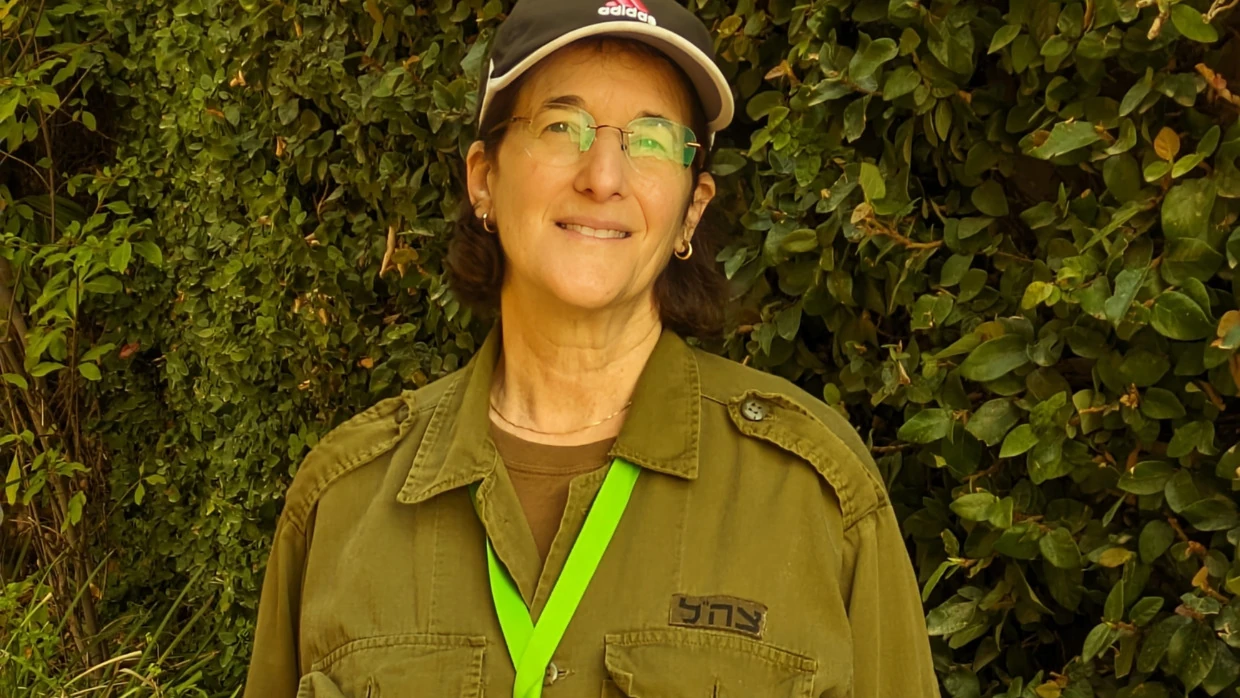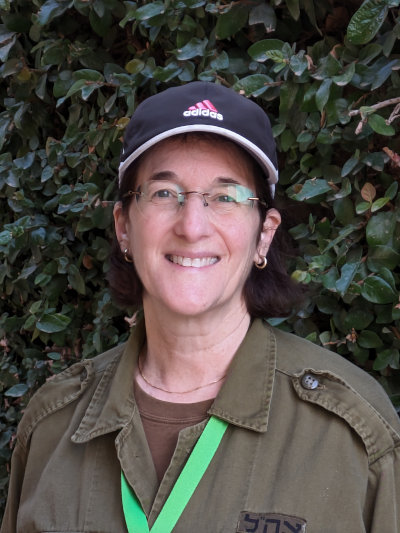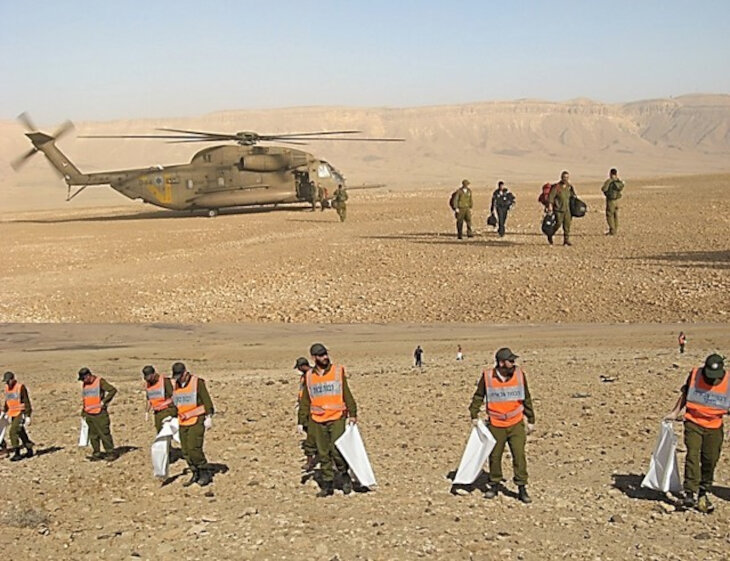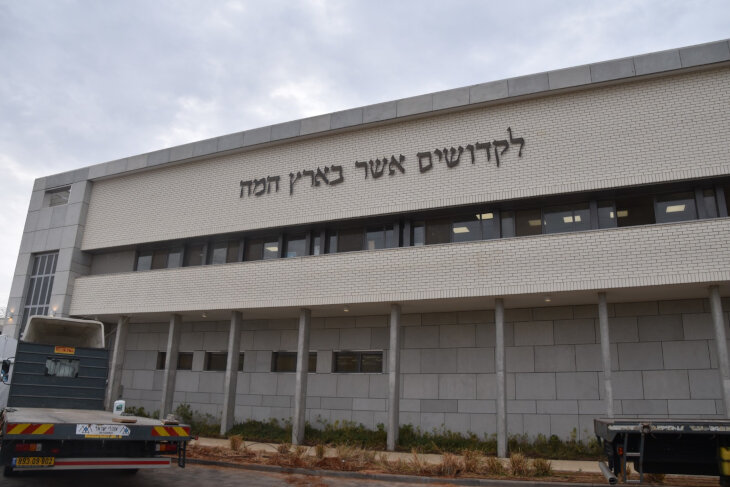 Vampire Weekend's Surprising Jewish Stories
Vampire Weekend's Surprising Jewish Stories


10 min read
The IDF Rabbinate created a unit in which women would assist in the identification process and burial preparation for a female fallen soldier. Then Oct 7th happened.
A person who has passed away can never personally repay the Chevra Kadisha, the Jewish burial society, for their diligence and kindness. It is a mitzvah that is therefore called chesed shel emet – a true kindness.
In Israel, the Rabbinate of the IDF (Israel Defense Forces) oversees this holy task when it is necessary to identify and bury a soldier. Any soldier in the IDF, male or female, who loses their life while enlisted, for whatever reason, has the right to be buried in an army cemetery and is taken care of by the army’s Casualty Treatment Unit that identifies and prepares fallen soldiers for burial.
Each soldier wears a dog tag with his name and identity number. Even during “normal” times, it might be difficult to identify the person due to the state of the body if they have fallen in battle or in a terror attack, in which case forensic specialists – usually doctors — are called in.
But the events of October made these identifications even more painfully complicated than usual.
If a female soldier dies while enlisted, she is taken care of by the army just as the men are. Volunteer women from around the country, who worked for the Chevra Kadishas in their hometowns, used to be called upon to assist the army professionals in the preparation for burial.
In the last ten years, more women have entering combat units in the army, therefore raising the risk of more female deaths. As a result of this new reality, the IDF Rabbinate created a designated unit in which women would be trained to assist in the identification process and burial preparation for a female fallen soldier.
In July 2023, the IDF Rabbinate decided to draft and categorize these volunteers as soldiers serving in reserve duty. Now when they come to volunteer, they are considered official members of the IDF. Thankfully, until October 7, they were not usually inundated with work.
And then the world exploded and everything changed.
 Sharon Laufer in uniform
Sharon Laufer in uniform
I recently caught up with Sharon Laufer, the person who had recruited the women for the first three cohorts of this unit, to learn what they have been doing since that black Shabbat, and how they’ve been coping.
Laufer says, “As a child, I was very fearful and anxious about death.” At the age of 16, after attending a summer camp session at which people from a Chevra Kadisha spoke, in the context of “Life Cycle Events,” she was very moved and thought that she needed more information.
She got "more information" when she was 29 and living in Teaneck, New Jersey with her husband Nathan, she saw a notice in the shul bulletin requesting volunteers for the women’s Chevra Kadisha. She responded, and experienced her first taharah, purification in Hebrew, where the body is washed and cleansed before burial.
“That day was a turning point in my life, not only because it was the beginning of my service, but because I found that it opened my heart in a way like nothing else that I would choose to do. I served on the Chevra Kadisha until moving to Israel in 2003.”
 Members of the IDF Chevra Kadisha searching for two crew members following a training accident in the Negev, Nov. 2010.
Members of the IDF Chevra Kadisha searching for two crew members following a training accident in the Negev, Nov. 2010.
This work helped Laufer overcome her fear of death. “You walk into the taharah room and you don’t know very much about the person on the table, however, the body and the soul speak volumes if you’re open to listening.”
The Laufers made Aliyah to Israel in 2003. They lived in Jerusalem, but the Chevra Kadisha there did not accept volunteers. In 2006, Laufer’s brother-in-law, Shimon Perchik, a Colonel in the reserves of the IDF, was the project leader who developed a computer system and associated protocols which would improve the ability and accuracy to identify soldiers who had died or been killed while in active service.
This system is the one that is still in use now, during the current war.
In 2010 Laufer and her family moved to Efrat. In April of that year, Colonel Perchik asked her if she would be interested in recruiting a group of women with two different capacities – women who were computer savvy, and women who would not be afraid to work with a woman’s dead body. “They would also be trained to handle situations of mass casualties,” says Laufer.
In June, 2011, the group had its first full training using the computer system and working with an actual model. They learned how to match dental records, fingerprints, and DNA to the main data system to confirm identity.
The halls were filled with stretcher after stretcher, on which the bodies were waiting to be received into our waiting hands.
On July 18, 2011, they got their first call-up. “After my first experience, I sent an email to the women who had been with me, writing: ‘It is obvious that our unit performs a very important role for the IDF Rabbinate regarding k’vod hamet, respect for the dead…’
“Since 2012, our group of women are regularly called upon for taharot in the IDF. I believe this work is one of the important things I was put here to do in this lifetime, especially after going through the last month. I’ve been given the strength and ability to do this work which is a privilege from God.
“I ask for help from God before I go into any taharah, so that I will be able to connect with the neshama (soul) and be compassionate. I understand that there is more beyond the body, and that the neshama needs help even after the person dies. We ask mechila (forgiveness) from the neshama of the deceased after we’re done. I always hold the hand of the deceased person and open my heart to give love and support so they will know they are loved. I see myself as a tool, as a vehicle for doing God’s work.”
What has her life been like since October 7th?
“We knew something was happening during the day, so I turned on my phone and I got a message that I needed to leave when Shabbat was over. We arrived at Shura. It was a very difficult sight. Some people had already been working during the day to start the identification process.”
Shura is the base where the IDF Rabbinate is located and has a dedicated area where all the bodies of those murdered were brought, for identification and preparation for burial of soldiers, police, and civilians.
 The IDF Rabbinate in Shura
The IDF Rabbinate in Shura
“My amazingly strong group of women were waiting for the bodies with our gowns, gloves, and masks on in the building in which we have worked and trained.
“Nothing prepared us for what came next. The halls were filled with stretcher after stretcher, on which the bodies were waiting to be received into our waiting hands.
“We worked through the night, and we were on call for the first two weeks doing 8- to 12-hour shifts every day.
“By the end of the second week, we started konenut (on-call) shifts from home since we had caught up with the quantity of bodies that were waiting to be identified.
“Once an identity is confirmed, the families are notified, and then we prepare the body for burial.”
“After reception has recorded their details, we escort them to the treatment room. It is not like any other treatment room they have been in before for a massage, a manicure, or a pedicure. We take care of every body there, aware of each neshama, but not in a way that any of us or they could have imagined.
“In this situation, it is not like with a regular purification because when someone dies ‘al kiddush Hashem’ [for being a Jew, sanctifying God’s Name], there is no taharah. Everything with blood is buried with the body. We patch up the wounds with absorbent cotton and then wrap them in the shrouds.
“We treat them as gently as we can. We feel our hearts touching theirs, as we wrap them in a linen winding sheet. We ask for forgiveness again…
“We also make sure to look for any personal effects or jewelry that may not have been noticed during the medical exam. These are precious treasures that we can give back to the family.
“We prepare the wooden coffin that will carry each one to her final resting place. The smell of freshly sawed wood, from these coffins, will never be the same for me. We lift and gently place each one in her coffin and again ask for forgiveness.
“For each one, we pray that our hands have done her life justice. We pray that her death not be in vain, and may her journey toward the light be without pain and may God receive her sacrifice as an unfathomable Kiddush Hashem (sanctification of God’s name) and may her neshama find peace.
“I pray also, may our tears and our hearts be healed from bearing witness to their sacrifice.”
I got into my car and it still smelled of death and decay from the day before. I could still smell it in my hair, my clothing, my shoes.
What about self-care for themselves and the psychological aspect?
“When I’m home I’m either writing in my journal or being creative in the kitchen.
On the base, each team has a debriefing at the end of each shift to discuss any difficulties that occurred during that shift, and we take care of one another. I call everyone on my shift to see how they are doing.
“Every day there is a mental health officer who checks in with us. Avigayil Bar-Asher, who has been the commander of the unit since 2016, calls us and even calls our spouses to see how they’re doing. We’ve had many sessions where we were able to speak about the most difficult situations we had dealt with over the last few weeks. We feel very supported.
“During the first week, when I left home in the morning to drive to the base, I got into my car and it still smelled of death and decay from the day before. Each day at the end of my shift, I could still smell it in my hair, my clothing, my shoes. That was really hard because even after I got home, after taking a shower and having a full night’s sleep, I’d get back in the car the following morning and the smell was still there. I couldn’t shake that.”
Laufer says a special bond is created among the women on the teams working with the deceased. “This is a moment and a memory that we will share for the rest of our lives. And just as there is a camaraderie among the women on my team, it also exists with all the male reserve soldiers on the base who are doing the same thing. There are haredim [ultra-Orthodox], secular, and religious individuals all working together. It’s a true moment of unity.
“The IDF knows they can rely on this group of exceptional women that is committed to help in any way needed. They know they can call any hour of the day and whoever is available says, ‘I will come.’
“To each of my dear partners who do this work with me, I want to say thank you for giving me strength in those very difficult moments, thank you for letting me support you, and for standing side-by-side as a team full of courage and dedication. You are all women of iron, with hearts of gold and souls filled with light.”
A version of this article originally appeared in the Jewish Journal.

Thank you for this brilliantly informative and sensitive article. Everyone who reads it will experience an aliya for his/her neshama. For all who participate in this holy work, HaShem has prepared a special reward for you. Please be strengthened as you continue this most important mitzvah.
I have seen calls for volunteers from outside Israel to go and volunteer for physically demanding farm work and similar necessary tasks. I have a disability that doesn’t prevent me from being on my local Chevra Kadisha. If any organization is recruiting women to go to Israel for this purpose, I hope that information can be shared here.
Rachel, thanks for writing. If you write to me directly, I will try to get your query to the right people. toby@wholefamily.com
Thank you for sharing. How beautiful are our practices -- the way we tenderly value and serve the deceased, respecting a life lived and the neshama that hovers nearby. This mitzvah surely brings solace not only to the soul of the deceased, but also to the mourning family, especially in time of war, when lives are sadly cut short.
I am so touched by the writer who shared the process of the deceased female soldier. I could hear her reverence for the neshama and the body. To ask mechilah (forgiveness) of the victim seveal times is so special. It feels like the deceased might hear the words of forgiveness and will make her feel appreciated for her life, the life she gave for our people, as she journeys to meet Hashem.
G-D bless these remarkable women doing this great Mitzvah.